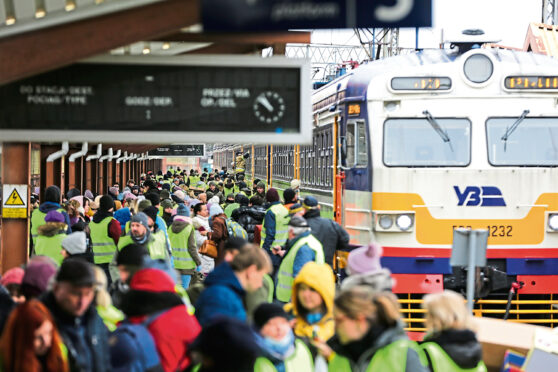
Home. Is there any other word in the English language that’s more loaded with emotion and meaning? Most of us are familiar with that feeling of getting back to the street where we live, and oh, that sense of joy as you close the front door behind you. Locking out the world and breathing a sigh of relief that you’re back home.
I’ve lived in my current house for more than 15 years now and while it’s looking a bit tatty and disorganised at the moment, I don’t care. It’s comfortable and familiar. That mark on the wall over there? It’s where my youngest daughter kicked a ball when she was mad about football.
And the black unseemly stain on the hall carpet, that I think only I ever really see, is the result of one of the kids dropping a bottle of dark nail varnish. I still remember how furious I was. There are stories and memories everywhere. And how I love it.
But not everyone has the security of a permanent home. It was revealed last week that 22 Ukrainian households in Edinburgh have become homeless since arriving in this country. This highlights the challenges displaced families have been having since fleeing wartorn Ukraine.
One councillor has blamed the Scottish Government, saying its scheme for housing Ukrainians has not been fully thought through. But the reality is that there is a much wider problem here.
Every 18 minutes a household becomes homeless in Scotland. Statistics show that in September 2022 there were nearly 14,500 people living in temporary accommodation. That number has risen sharply over the last few years and is now 40% higher than 2014. We are facing a homelessness emergency according to campaigners.
We recently covered this issue on Scotland Tonight and I met Tracy, who’d been living in temporary accommodation for four years. Her flat is a disgusting mess, covered in mould, damp and intermittently infested with rats. She has no hot water in the bathroom and no working shower.
She’s at her wits’ end but the landlord has done nothing to the property for 15 years. The grandmother of one told us that she would be more comfortable if she were locked up and living in a prison. I’m delighted to say that after her story appeared on TV, the landlord was forced to start tackling the problems.
Accommodation is in very short supply nationally and particularly in Scotland’s capital. There are simply not enough new houses being built for a myriad of reasons, not least that buying the land is hugely expensive.
Charities like Crisis and the Cyrenians say council intervention comes far too late. It’s only when a situation reaches crisis point and people are about to lose the roof over their heads that the local authority can step in.
Campaigners believe that prevention is the answer. For instance, why not sort a tenant’s rent arrears before it reaches the point of eviction and also try to mediate to stop relationships and families breaking up, which often means youngsters leaving home, effectively making them homeless.
John also spoke to us and told us his experience of not having a home for many years: “I was a ghost, I had no address, no phone number, I fell through the cracks and nobody noticed. You don’t have a base; you don’t have any security or any warmth. You’re just aimlessly floating around and it’s not a nice place to be.”
Two and a half years ago he got the keys to his own flat. “I’ve found peace,” he said. He’s now working for a homeless charity and is evangelical about the right to a permanent home.
He’s disheartened that the issue of homelessness is only getting worse in Scotland and feels there should be more of a sense of urgency in trying to solve the problem.
The Scottish Government says that tackling homelessness and ending rough sleeping is a top priority but in the meantime many families are living disturbed and uncertain lives.

Enjoy the convenience of having The Sunday Post delivered as a digital ePaper straight to your smartphone, tablet or computer.
Subscribe for only £5.49 a month and enjoy all the benefits of the printed paper as a digital replica.
Subscribe